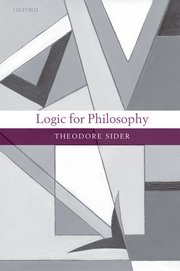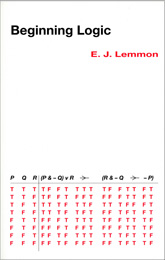Advanced Deductive Logic
General Information
Course OVERVIEW
COURSE DESCRIPTION
This course covers various advanced topics about and within deductive logic. First, about logic, we will investigate the nature(s) and purpose(s) of symbolic logic, the relationship of logic to rationality, model-theoretic and proof-theoretic approaches to doing logic, and metalogical notions such as soundness, completeness, and computability. Second, within logic, we will survey a variety of non-classical logics developed with philosophical applications in mind. We will discuss some subset of the following systems as well as their philosophical applications: basic modal logic, deontic logic, epistemic logic, tense logic, many-valued logics, intuitionistic logic, and relevance logic. In the Spring 2015 version of this class, we will pay particular attention to deductive approaches to the logic of belief revision.
COURSE OBJECTIVES
By the end of this course and successful completion of all course requirements, the student will at least be able to do all of the following:
- explain various motivations for using formal languages to do logic,
- distinguish model-theoretic / semantic and proof-theoretic approaches to formal logic,
- compare the notions of soundness and completeness, and summarize soundness and completeness proofs for classical logic,
- compare and contrast various non-classical logics, and summarize various philosophical motivations and applications for these logics.
COURSE PREREQUISITES
I will assume that students have a working knowledge of deductive logic up through predicate logic (If you’ve taken PHIL 3200 and remember what you learned there, then you’re fine). If you aren’t in this position, you should not take this course.
Course Materials
REQUIRED TEXTBOOKS
Theodore Sider,Logic for Philosophy (Oxford, 2010).
Neil Tennant, Changes of Mind: An Essay on Rational Belief Revision (Oxford, 2013).
RECOMMENDED TEXTBOOKS
E. J. Lemmon, Beginning Logic (Hackett, 1978).
|
 |
|

|
|
 |
OTHER RESOURCES
Online Syllabus: http://jonahschupbach.com/courses/6200/S15/index.html
In addition to this site, I will be using CANVAS in order to make other readings available to you all, to keep you updated on your grades, for course communication, and also for our course calendar.
COURSE Requirements
ATTENDANCE / PARTICIPATION
(20% of final grade for PHIL 5200)
Attendance and active participation are required of everyone in this course and will factor into the final course grade for undergraduates. Please let me know ahead of time if you plan to be absent on any day.
HOMEWORK
(40% of final grade)
Periodic homework assignments will be posted on the course schedule. Assignments are due on Friday by 4pm -- students should deliver them to my mailbox in CTIHB 402F. After the due date, I will post solutions on CANVAS so students can check their work. I will not accept any late homework, and I will not drop any scores at the end of the semester. Your overall homework grade at the end of the term will be calculated as a straight average of all of your homework grades throughout the term.
EXAMS
(40% of final grade)
Students will take a midterm and final exam. These will be take-home exams, and the final will be cumulative. I will not accept any late exams.
PRESENTATION (graduate student requirement only)
(20% of final grade for PHIL 6200)
Graduate students enrolled in this course will be responsible for doing an in-class presentation / leading our class discussion over some portion of the Tennant text.
Grading
Final letter grades will follow a standard 10-point scale: 98-100 A+, 92-98 A, 90-92 A-, 88-90 B+, 82-88 B, 80-82 B-, etc. I will not be using a curve when calculating your grades.
Policies, etc.
MISSING AND LATE ASSIGNMENTS
In general, I do not allow students to make up late homework or exams. Some exceptions might be made (at my discretion) in cases where students have a valid reason excusing them and evidence of that reason (e.g., sickness and a doctor’s note).
HUMANITIES ACADEMIC MISCONDUCT POLICY
Academic misconduct includes cheating, plagiarizing, research misconduct, misrepresenting one’s work, and inappropriately collaborating. Definitions can be found in the Student Code.
If you are suspected of academic misconduct, the process proceeds according to the rules found in the Student Code, University Policy 6-400(V). According to that policy, after meeting with you, the instructor must determine whether academic misconduct has, in fact, occurred.
- If s/he determines that no academic misconduct has occurred, s/he will document that you are not responsible for any academic misconduct.
- If s/he determines academic misconduct has occurred and this is the first instance in which you have been alleged to have committed academic misconduct, s/he will take into account whether the act was intentional or a result of negligence in determining the appropriate sanction, which can be up to failing the course. The sanction will be noted in the resolution of the case and your right of appeal is as specified in Policy 6-400(V).
- If s/he determines academic misconduct has occurred, and you have previously been sanctioned for an act of academic misconduct, and the prior instance of misconduct resulted in a sanction less than failing the course, the department will follow the process to fail you for the course. If the prior sanction was failure of the course, your new act of misconduct will result in failure of the course and the department will also follow the process to seek your dismissal from the program and the University.
ADA STATEMENT
The University of Utah seeks to provide equal access to its programs, services and activities for people with disabilities. If you will need accommodations in the class, reasonable prior notice needs to be given to the Center for Disability Services, 162 Olpin Union Building, 581-5020 (V/TDD). CDS will work with you and the instructor to make arrangements for accommodations. All information in this course can be made available in alternative format with prior notification to the Center for Disability Services.
GENERAL EDUCATION STATEMENT
This course contributes to the University of Utah's Quantitative Reasoning and Quantitative Intensive requirements. For such courses, academic units must identify three essential learning outcomes (ELOs) that are relevant to university general education objectives. The ELOs for this course are: Inquiry and Analysis, Quantitative Literacy, and Foundations and Skills for Lifelong Learning.


